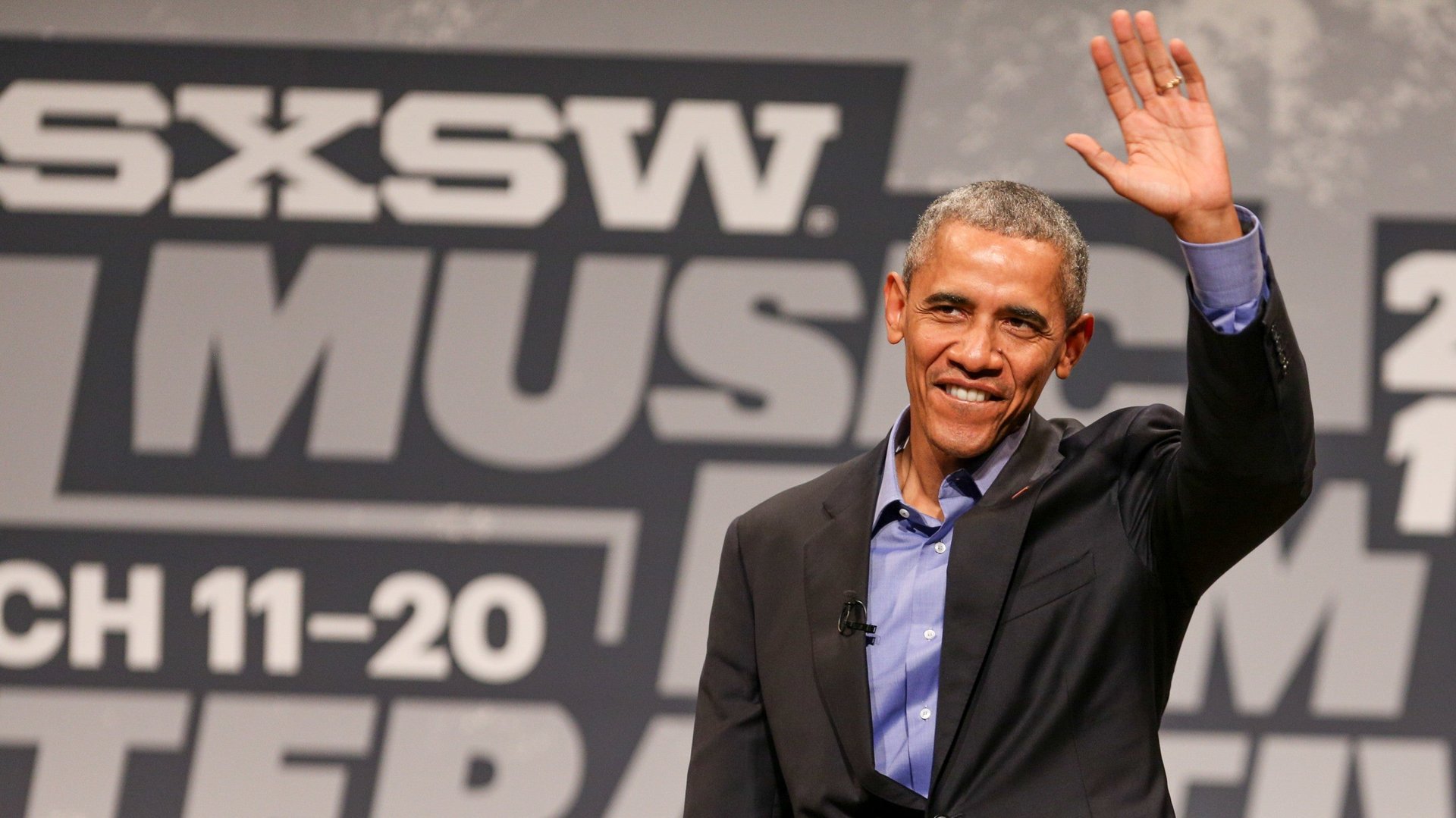Obama goes tech recruiting and defends his digital legacy at SXSW
Austin, Texas


Austin, Texas
“The reason I’m here really is to recruit all of you,” Barack Obama said today at SXSW Interactive, calling for the tech community to work on solutions for America’s biggest problems. But despite the US president’s flattery, the tech community remains wary about Obama’s insistence on compromise when it comes to encryption.
A SXSW survey conducted with Edelman, released just before the festival, highlighted the still-tenuous relationship between the tech sector and the government: 61% of respondents said that they have more faith in technology-based solutions than policy measures to combat societal problems. So the tech sector should do something about it, according to Obama. “We cannot solve the problems in government and collectively as a society unless we the people are paying attention,” he said.
One thing most people in the audience were paying attention to is the FBI-Apple fight. Obama asked the tech community to not take an absolutist stance on encryption. “I’m of the view that there are very real reasons why we want to make sure government cannot just willy nilly get into people’s iPhones or smartphones that are full of personal data,” Obama said.
But the Snowden issue vastly overstated the danger to US citizens in terms of spying, he said. Encryption is vitally important when protecting air traffic control systems and the financial system and preventing terrorism, he said, but “if government can’t get in, then everybody’s walking around with a Swiss bank account in their pocket.” He compared the government having warranted access to encrypted data with having traffic stops to catch drunk drivers.
“If the tech community says strong encryption or nothing, you’ll find after something really bad happens, the politics of this will swing, and it will be sloppy and rushed and then you’ll really have dangers to our civil liberties because the people who care most about it have disengaged,” he said.
“The question we now have to ask, if technologically it’s possible to make an impenetrable device or system where the encryption is so strong there’s no key, no door at all, then how do we apprehend the child pornographer, how do we solve or disrupt a terrorist plot?”
Creating greater online access to public services, tackling big problems and making government work more efficiently are the big goals for Obama’s digital legacy. The president seemed to embrace the laid-back atmosphere in Austin, appearing on stage without a tie. Texas Tribune editor Evan Smith, interviewing him, asked whether we ought to make sure that all Americans are online first. “That’s exactly what we’re trying to do,” Obama replied. “When we passed the recovery act, the stimulus that was unpopular at the time. But unemployment is now under 5%, and we avoided a great depression. ‘Thanks Obama.’” The crowd roared.
Government is risk-averse, big and slow; tech is sleek and fast to fail, Smith said. How do you get the two to work together? Obama let out a big sigh, getting laughs from the audience. He cited the initial failure of HealthCare.gov as the event that pushed him to create in 2014 the government organization known as U.S. Digital Services, which draws top talent from Silicon Valley for short tours of duty. “There’s no system they can’t make better,” he said.
This was the first time a sitting president made an appearance at SXSW in its 30-year history–an event Obama missed former first lady Nancy Reagan’s funeral to attend. (It’s worth noting that the announcement of Obama’s appearance, and the myriad arrangements needed for a presidential entourage, were made well before Reagan died.) Advertising Age called Obama’s visit the “ultimate SXSW brand activation.”
With 10 months left in his tenure, Obama is doubling down on his legacy as the first digital president. In the days ahead of SXSW, the White House announced its ConnectALL initiative to connect 20 million more Americans to broadband internet by 2020, and expanded the number of cities included in the TechHire initiative to 50. The White House also announced the dates for the 2016 National Week of Making (June 17-23), released a draft of its source code policy, launched a Digital Acquisitions Pilot and revealed a cross-sector initiative to make diapers more affordable for the neediest families.
Low-income families spend an average of $936 per child on diapers every year , the White House says, which accounts for as much as 14% of their income. On average, poorer families pay double what some higher-income families pay–likely because when you’ve got money, you can order diapers in bulk online, driving down the per-Pamper cost. Obama is putting down $10 million to find a better way to get affordable diapers to families who need them, working with nonprofits as well as eco-commerce startup Jet.com and diaper makers.
Perhaps because of the impending elections, the congressional presence at SXSW this year is a bit smaller than last year, when 22 members were speaking in official sessions and 35 total were present. This year, 17 members are on the schedule. But leaders of many federal agencies are on deck, including chief technology officer Megan Smith, transportation secretary Anthony Foxx, and Alan Davidson of the Commerce Department. First Lady Michelle Obama will be presenting the opening keynote for the music week at SXSW on Wednesday (March 16).